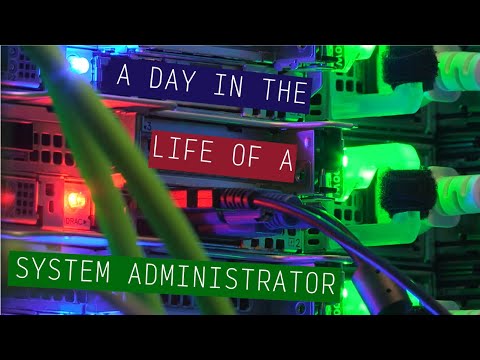High-Paying System Administrator Job: Explore Salary & Duties

System Administrator Job Description Template
System Administrator Job Description A system administrator is a professional responsible for the installation, maintenance, and troubleshooting of computer systems and networks within an organization. They play a crucial role in ensuring the smooth functioning of the company’s technology infrastructure. The main responsibilities of a system administrator include managing user accounts and access, monitoring system performance, performing backups and data recovery, installing and updating software and hardware, and resolving technical issues. They also need to ensure the security of the systems by implementing necessary protocols and firewalls, and regularly updating antivirus software. System administrators are required to have a strong understanding of various operating systems, such as Windows, Linux, and Unix, as well as networking protocols and hardware. They should possess excellent problem-solving skills and be able to quickly identify and resolve technical issues. One important aspect of the system administrator’s role is effective communication. They need to collaborate with other IT professionals, such as network engineers and software developers, to ensure seamless integration and operation of different systems. Additionally, they must communicate technical information to non-technical individuals in a clear and concise manner. In conclusion, system administrators play a vital role in maintaining the functionality and security of computer systems. Their expertise in troubleshooting and problem-solving, along with their knowledge of operating systems and networks, is crucial for the success of an organization’s technology infrastructure.System Administrator Responsibilities
System Administrator Requirements
How Much Does A System Administrator Make?
System Administrator Salary
| Position | Salary Range |
|---|---|
| Junior System Administrator | $40,000 – $60,000 |
| Mid-Level System Administrator | $60,000 – $80,000 |
| Senior System Administrator | $80,000 – $100,000 |
| Lead System Administrator | $100,000 – $120,000 |
System administrators play a crucial role in managing and maintaining computer systems and networks within an organization. They are responsible for ensuring the smooth operation of IT infrastructure, troubleshooting technical issues, and implementing security measures. The salary range for system administrators varies depending on their level of experience and the size of the company they work for. Entry-level positions such as Junior System Administrator typically earn between $40,000 and $60,000 annually, while more experienced professionals in senior roles can earn between $80,000 and $120,000 per year. The salary range may also be influenced by factors such as location and industry. Overall, system administration offers competitive salaries and opportunities for career growth in the IT field.
System Administrator Salaries by Country
Top Paying Countries for System Administrator
| Country | Average Salary (USD) |
|---|---|
| United States | 75,000 |
| Switzerland | 70,000 |
| Australia | 65,000 |
| Germany | 60,000 |
| Canada | 55,000 |
A system administrator’s salary can vary significantly based on the country they work in. The top paying countries for system administrators include the United States, Switzerland, Australia, Germany, and Canada. In the United States, the average salary for a system administrator is $75,000. Switzerland follows closely with an average salary of $70,000, while Australia offers an average salary of $65,000. In Germany, system administrators earn an average of $60,000, and in Canada, the average salary is $55,000. These countries offer competitive salaries for system administrators due to the high demand for their skills and expertise in managing complex computer systems and networks.
A video on the topic System Administrator
Video Source : Institute for Cyber-Enabled ResearchInterview Questions for System Administrator
1. What is a system administrator?
A system administrator is responsible for managing, maintaining, and troubleshooting computer systems, networks, and servers. They ensure the smooth operation of the organization’s IT infrastructure and provide technical support to users.
2. What are the key responsibilities of a system administrator?
The key responsibilities of a system administrator include installing, configuring, and maintaining hardware and software, monitoring system performance, troubleshooting issues, ensuring data backup and recovery, managing user accounts and access permissions, and implementing security measures.
3. How do you ensure system security?
To ensure system security, a system administrator can implement measures such as regular software updates and patches, strong password policies, firewall and antivirus software, network monitoring, user access controls, and data encryption.
4. How do you handle system failures or crashes?
When a system failure or crash occurs, the first step is to identify the cause of the issue. System administrators can analyze log files, use diagnostic tools, and consult with vendors if necessary. Once the cause is determined, they can take appropriate steps to resolve the issue, such as restoring from backups, applying patches, or replacing faulty hardware.
5. What backup strategies do you use?
As a system administrator, I would implement a combination of full backups, incremental backups, and differential backups. Full backups capture all data and are performed periodically, while incremental backups only back up changes since the last backup, and differential backups back up changes since the last full backup.
6. How do you handle user account management?
User account management involves creating, modifying, and deleting user accounts, as well as managing access permissions. As a system administrator, I would follow a standardized process for user account management, ensuring that accounts are created or modified based on the user’s role and responsibilities, and that access permissions are granted or revoked as needed.
7. How would you handle a security breach?
In the event of a security breach, I would first isolate the affected system or network segment to prevent further damage. Then, I would investigate the breach to determine the extent of the damage and identify the vulnerabilities that were exploited. I would take immediate steps to patch the vulnerabilities, remove any malicious software, and strengthen security measures to prevent future breaches.
8. How do you stay updated with new technologies and trends in the industry?
As a system administrator, I regularly participate in professional development activities such as attending conferences, workshops, and webinars. I also follow industry blogs, forums, and newsletters to stay updated with the latest technologies and trends. Additionally, I engage in self-study and experimentation to gain hands-on experience with new technologies.
9. How would you handle a system upgrade or migration?
For a system upgrade or migration, I would first analyze the requirements and potential impact on the existing infrastructure. I would create a detailed plan outlining the steps involved, including data backup, testing, and rollback procedures. Communication with stakeholders and end users is essential throughout the process to manage expectations and minimize disruptions.
10. How do you prioritize and manage multiple tasks?
To prioritize and manage multiple tasks, I would use a combination of time management techniques such as creating a to-do list, setting deadlines, and categorizing tasks based on urgency and importance. I would also delegate tasks when appropriate and communicate with stakeholders to manage expectations and ensure clarity on priorities.






